- Last Updated: December 16th, 2025
Key Takeaways
Social media platforms face lawsuits for contributing to mental health issues like anxiety, depression, and eating disorders among users, particularly adolescents.
Teens and young adults are more vulnerable to the negative effects of excessive social media usage, which often leads to serious mental well-being concerns.
Evidence gathering and seeking legal advice from specialized law firms like TruLaw are vital for those seeking justice for social media harm injuries.
Overview of the Social Media Harm Lawsuit Injuries
On this page, we’ll discuss the Social Media Harm Lawsuit Injuries, mental health effects of excessive social media use, who qualifies to file a Social Media Harm Lawsuit, and much more.
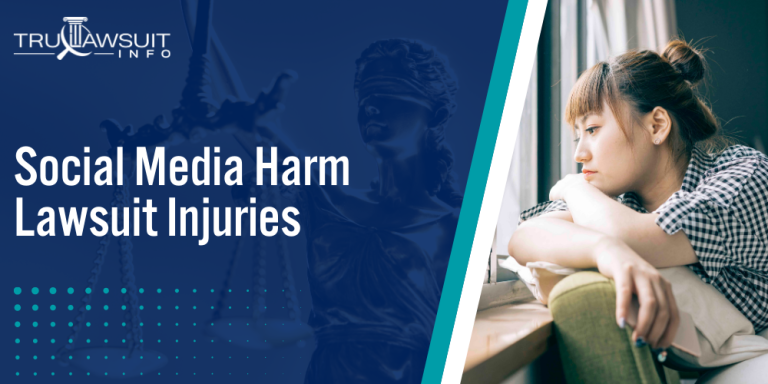
Intro to Social Media Harm Lawsuit Injuries
Common elements of the social media harm lawsuit injuries include, but are not limited to:
- Design and deployment of platform features purported to impact children’s mental health negatively.
- Accusations that companies prioritized engagement over the health and mental hygiene of young users.
- A coalition spearheaded by attorneys general from multiple states asserting that tech giants like Meta have contributed to a youth mental health crisis.
- Allegations that the Meta and other social media platforms have not only ignored the mental health crisis but have potentially profited from it.
If you or someone you love has experienced social media harm that has led to an injury, you may qualify to pursue compensation.
Contact TruLawsuit Info using the chat on this page to receive an instant case evaluation.
Social Media Harm Lawsuit: Driving Corporate Accountability
Amidst the wave of social media scrutiny, lawsuits have become pivotal in driving corporate accountability, highlighting the role of internal policies and ethical responsibilities of tech companies.
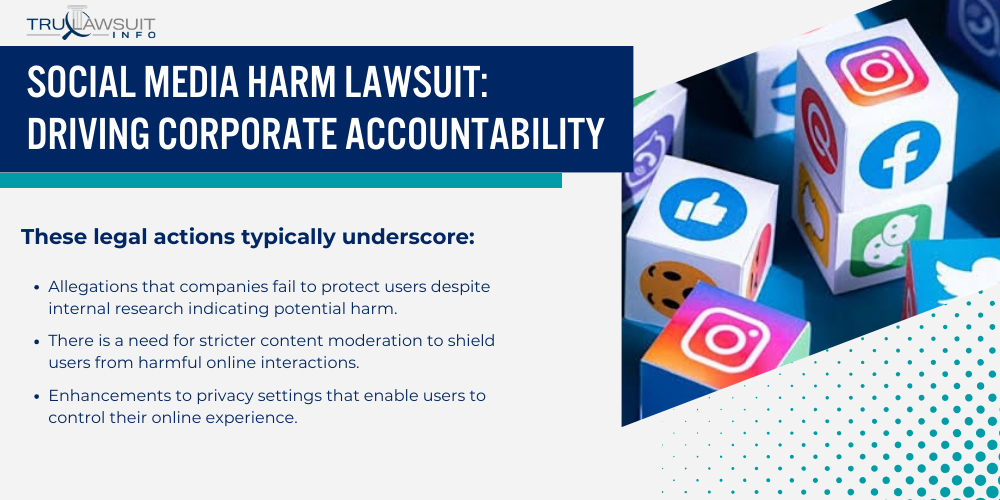
Internal Policies and User Protection
Lawsuits have brought into question the effectiveness of social media companies’ internal policies in safeguarding users, especially vulnerable populations such as youth.
These legal actions typically underscore:
- Allegations that companies fail to protect users despite internal research indicating potential harm.
- There is a need for stricter content moderation to shield users from harmful online interactions.
- Enhancements to privacy settings that enable users to control their online experience.
- The implementation of warning systems to alert users and guardians of potential mental health impacts.
Linked to lawsuits against Meta, for example, is the concern that internal research highlighted the risk of mental health issues in young users without leading to significant protective measures.
Responsibilities and Ethical Considerations
Tech and social media companies’ ethical obligations are under scrutiny, and lawsuits are prompting a re-evaluation of their responsibilities.
Noteworthy points include:
- Ensuring that user well-being is prioritized over engagement metrics in product design.
- Acknowledging the impact of algorithms that may contribute to user addiction or unhealthy usage patterns.
- The role of school districts in collaborating with social media entities to combat online risks for students.
- The parent company’s liability in overseeing its subsidiaries and enforcing comprehensive user protection standards.
Leaked internal Facebook documents, for instance, prompted questions about whether parent companies sufficiently address the ethical considerations of their platforms’ designs and policies.
Legal Landscape of the Social Media Harm Lawsuit
The legal landscape surrounding social media harm lawsuits is dynamic, with historic cases setting precedents and current legal efforts challenging the boundaries of platform responsibility.
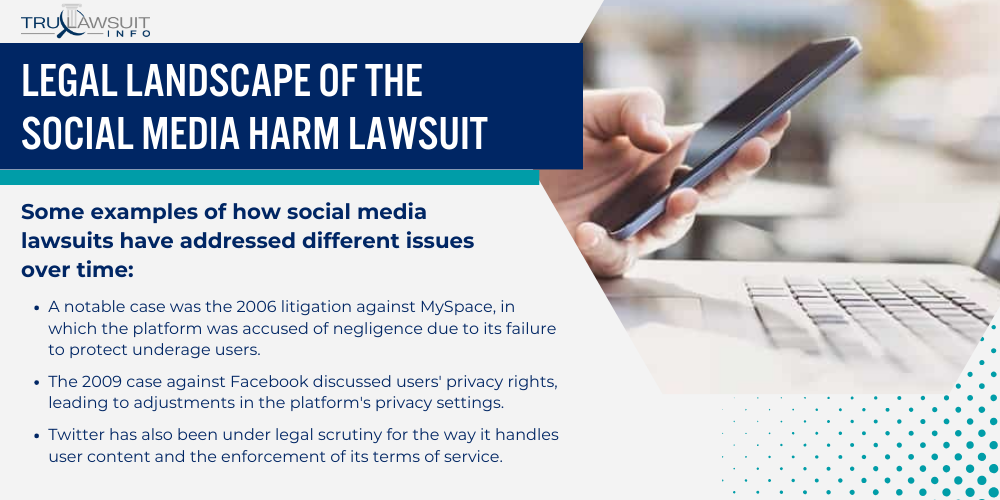
Historic Lawsuits Against Social Media
Historic legal actions have laid the groundwork for understanding how social media platforms may be held accountable for user harm.
The outcomes of these cases have influenced the strategies and expectations surrounding social media harm litigation.
Some examples of how social media lawsuits have addressed different issues over time:
- A notable case was the 2006 litigation against MySpace, in which the platform was accused of negligence due to its failure to protect underage users.
- The 2009 case against Facebook discussed users’ privacy rights, leading to adjustments in the platform’s privacy settings.
- Twitter has also been under legal scrutiny for the way it handles user content and the enforcement of its terms of service.
- In 2018, a social media addiction lawsuit against Snapchat questioned the ethics of their “streak” feature, which potentially encouraged addictive behaviors.
Current Legal Potentials
Current legal potentials in social media addiction lawsuits reflect evolving discussions on the extent of harm these platforms can inflict, especially on younger demographics who may be more vulnerable.
These lawsuits focus on several key areas:
- Current litigation focuses on the design and features of social media platforms like Instagram, which are alleged to foster addiction.
- A groundbreaking Multi-District Litigation (MDL) involves numerous platforms accused of promoting excessive screen time.
- Colorado led a bipartisan coalition of attorneys general in suing Meta for features on Instagram alleged to addict children and teens, as stated in a government news release.
- California’s involvement has seen Attorney General Bonta headlining an effort, as detailed in a press release from the California Department of Justice, backed by 33 attorneys general, to hold Meta accountable for its platforms’ impact on youth mental health.
Social Media Addiction Causing Youth Mental Health Crisis
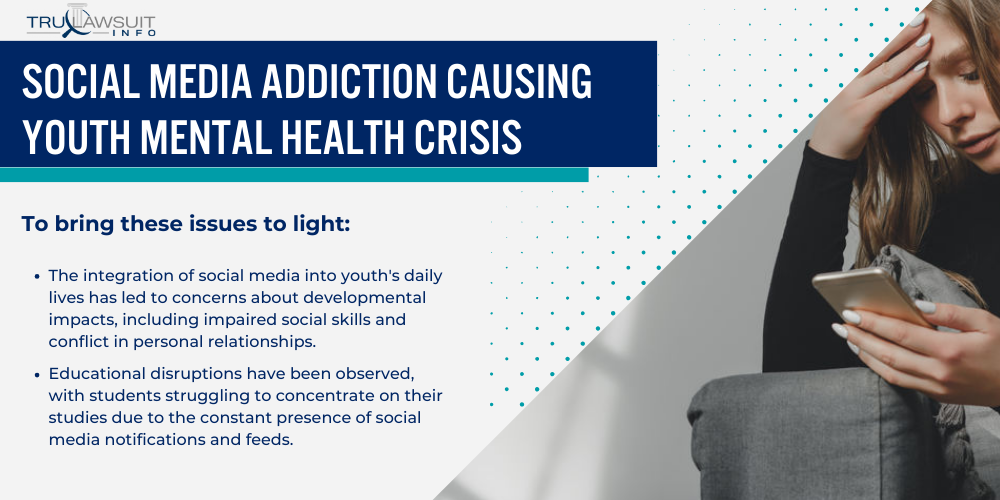 The rise of social media addiction is increasingly being recognized as a catalyst for a mental health crisis among young people, with numerous youth mental health programs acknowledging the challenges posed by excessive social media use.
The rise of social media addiction is increasingly being recognized as a catalyst for a mental health crisis among young people, with numerous youth mental health programs acknowledging the challenges posed by excessive social media use.
Societal Consequences
Excessive social media use among young people has been linked to negative societal impacts.
To bring these issues to light:
- The integration of social media into youth’s daily lives has led to concerns about developmental impacts, including impaired social skills and conflict in personal relationships.
- Educational disruptions have been observed, with students struggling to concentrate on their studies due to the constant presence of social media notifications and feeds.
- There is an emerging pattern where prolific social media usage correlates with reduced physical activity among young people, raising concerns about long-term health consequences.
- Law enforcement and social welfare entities have flagged a rise in cyberbullying incidents, which is often a direct result of social media platforms facilitating anonymous or indirect aggression.
Public Health Considerations
Recognizing social media addiction as a public health threat requires a focused approach from various health entities.
Highlighting the gravity of this issue:
- Youth mental health programs are working tirelessly to design interventions that mitigate the harmful effects of social media on mental well-being.
- Healthcare providers are seeing an uptick in the number of young people presenting symptoms related to anxiety and depression linked to social media use.
- Public health campaigns now routinely include guidance on healthy social media usage to prevent addictive patterns from forming among youth.
- Government agencies, such as the Office of the Surgeon General, issue advisories on social media’s effects and provide resources to tackle these challenges, as highlighted in a recent advisory.
Potential Solutions in the Social Media Harm Lawsuit
The social media landscape can be challenging, and both users and platforms have a role to play in creating a safer online environment.
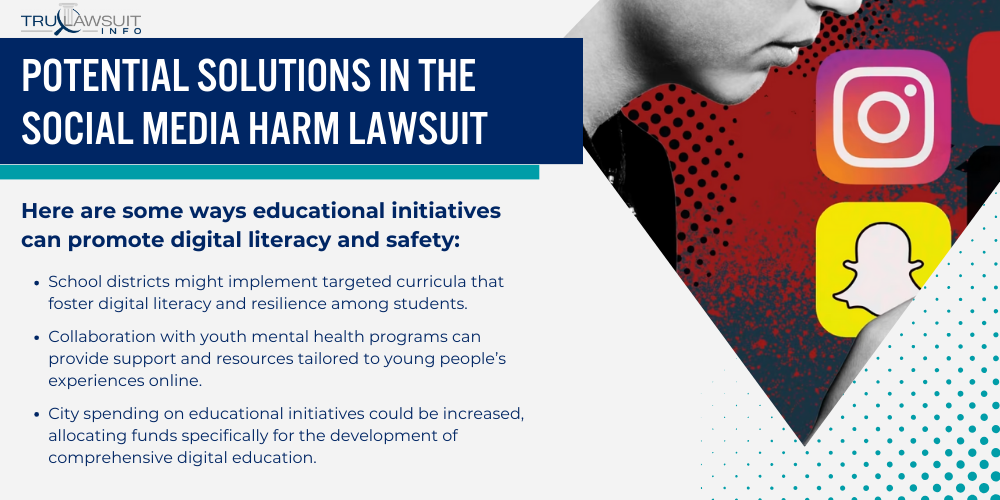
Educational initiatives can empower individuals to navigate this digital world with critical thinking and well-being in mind.
Educational Initiatives
Educational programs play a pivotal role in equipping individuals with the knowledge to navigate the online world safely.
Here are some ways educational initiatives can promote digital literacy and safety:
- School districts might implement targeted curricula that foster digital literacy and resilience among students.
- Collaboration with youth mental health programs can provide support and resources tailored to young people’s experiences online.
- City spending on educational initiatives could be increased, allocating funds specifically for the development of comprehensive digital education.
- Partnerships with organizations like the Pew Research Center could ensure educational material is data-driven and reflects current online trends.
Legal Reforms and Regulations
Legal measures aim to hold social media platforms accountable and establish a safer online environment.
Here are some proposed legal reforms to achieve this goal:
- Revamping regulations to include specific provisions that protect minors from potential harm on social media platforms.
- Incentivizing platforms to create healthier user experiences that prioritize the mental health of young audiences.
- Legal reforms might also require Meta and other social media companies to disclose their policies and the algorithms that govern content delivery to youth.
- Legislators could consider statutory frameworks that ensure a percentage of city spending is directed toward implementing and enforcing these new regulations.
Case Studies and Research Findings: Social Media Harm Lawsuit
Recent case studies and research findings shed light on lawsuits related to social media harm, highlighting crucial insights into legal actions and the impact of platform policies on user well-being.
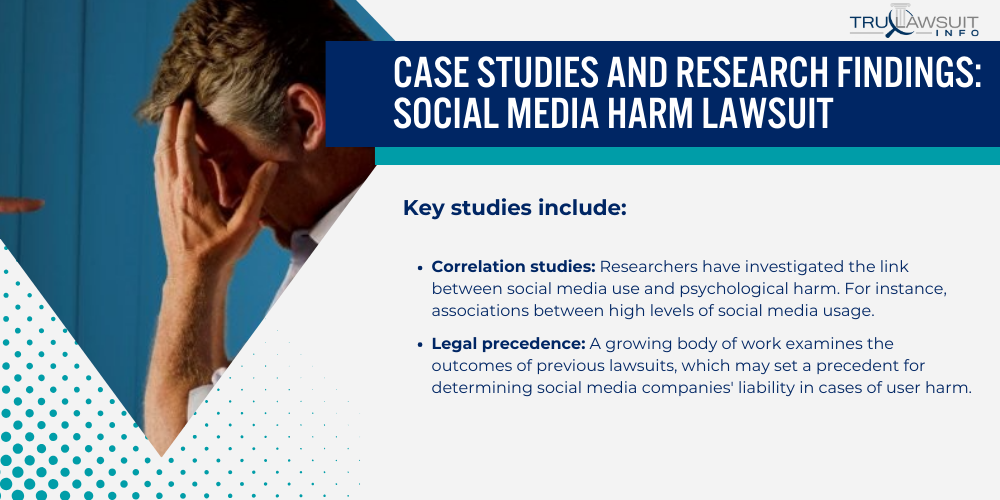
Academic Analyses
Research into social media harm lawsuits reveals a range of academic perspectives on the accountability of platforms for user experiences.
Key studies include:
- Correlation studies: Researchers have investigated the link between social media use and psychological harm. For instance, some have found associations between high levels of social media usage and an increase in symptoms of depression and anxiety, particularly among young adults.
- Legal precedence: A growing body of work examines the outcomes of previous lawsuits, which may set a precedent for determining social media companies’ liability in cases of user harm.
- Risk factors: Academic papers have identified specific risk factors, such as cyberbullying and exposure to harmful content, that may be instrumental in shaping future platform regulation and the evolution of lawsuits.
- Pew Research Center’s studies: The center has consistently provided data on social media usage patterns and public opinion on privacy and safety issues online, which serve to inform ongoing legal debates about harm.
Industry Reports and Documents
Industry Reports and Documents provide a unique window into the inner workings of social media platforms.
These reports, often confidential, can shed light on how these companies function and the potential consequences of their design choices.
Social media companies’ internal research and industry documents can offer valuable insight into how these platforms operate and the potential for harm:
- Policy reviews: Leaked or disclosed documents often include policymaking guidelines and content moderation strategies, revealing the companies’ self-regulatory practices.
- User harm reports: Some reports within companies, as seen in leaked documents from firms like Facebook, indicate an awareness of the potential harm to users, including acknowledging products can lead to mental health issues.
- Internal research findings: Insights from internal research have occasionally surfaced in legal cases, demonstrating how platforms could mitigate harm but may fail to do so effectively.
- Whistleblower testimonies: Former employees sometimes offer detailed accounts of systemic issues, providing first-hand evidence of how platform policies can contribute to user harm.
Protecting Vulnerable Groups from Social Media Harm Lawsuit
In recent legal actions, Attorneys General from multiple states have initiated a coordinated effort to address the damaging effects of social media on vulnerable demographics, particularly focusing on children and young adolescents and the proliferation of exploitative content.
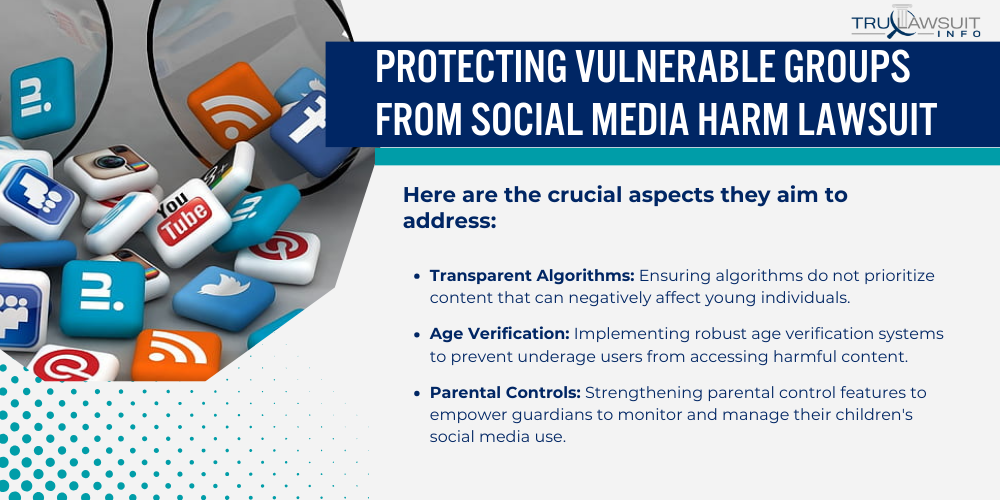
These lawsuits underscore the urgent need to safeguard the mental health of young users and prevent exposure to harmful materials online.
Children and Young Adolescents
The mental well-being of children and young adolescents is at the forefront of the current legal challenge.
Social Media Attorneys General assert that companies like Meta have developed platforms that contribute to the youth mental health crisis, specifically targeting features that may foster addiction and undermine mental health.
Here are the crucial aspects they aim to address:
- Transparent Algorithms: Ensuring algorithms do not prioritize content that can negatively affect young individuals.
- Age Verification: Implementing robust age verification systems to prevent underage users from accessing harmful content.
- Parental Controls: Strengthening parental control features to empower guardians to monitor and manage their children’s social media use.
- Education Programs: Educating young users about the potential mental health risks associated with social media use.
For instance, New York Attorney General Letitia James’s social media lawsuit against Meta highlights the need to address these concerns, initiating legal action to prompt more accountable design and deployment of features on social media platforms.
Action Against Exploitative Content
Combatting exploitative content, such as child sexual abuse material (CSAM), is a major subsection of these lawsuits.
Legal efforts emphasize the prevention and swift removal of such damaging material from social media platforms.
The key actions include:
- Robust Monitoring Systems: Implementing advanced detection technologies to identify and remove CSAM promptly.
- Reporting Mechanisms: Creating clear and user-friendly reporting channels for users to flag exploitative content.
- Collaboration with Law Enforcement: Strengthening partnerships between social media companies and law enforcement to address and prevent the spread of illegal content.
- User Education: Informing users about the dangers of exploitative content and how to protect themselves online.
In alignment with these actions, a bipartisan coalition of attorneys general has filed lawsuits against digital platform giants as a commitment to eradicating exposure to content that endangers the mental health and safety of young users.
Future Implications of the Social Media Harm Lawsuit
In light of recent legal actions against social media companies, the landscape for digital platforms may face significant changes.
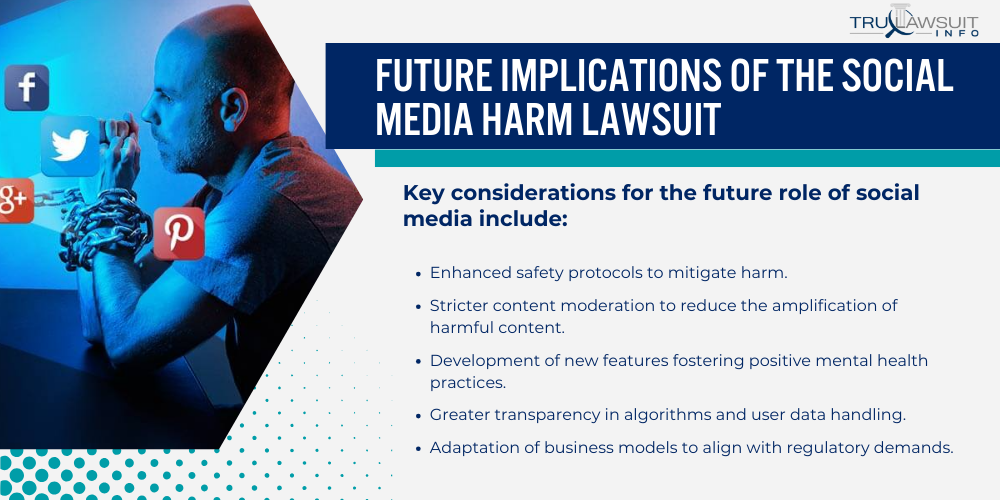
Examining the roles these platforms may play and the potential legal shifts can offer insight into the future they may shape.
Social Media’s Future Role
Social media companies have been cornerstones of the digital age over the past decade.
However, due to increasing scrutiny, the giants overseeing major social media platforms are now at a crossroads.
Key considerations for the future role of social media include:
- Enhanced safety protocols to mitigate harm.
- Stricter content moderation to reduce the amplification of harmful content.
- Development of new features fostering positive mental health practices.
- Greater transparency in algorithms and user data handling.
- Adaptation of business models to align with regulatory demands.
- Responsiveness to public concern regarding digital wellness.
These elements will shape not just social media platforms but potentially other digital platforms as they evolve alongside societal expectations and future social media trends.
Anticipated Legal Developments
The ongoing lawsuits against social media entities hint at an era of heightened anticipated lawsuits that may redefine the obligations and liabilities of technology companies.
Projected legal shifts might include:
- Implementation of new legislation governing digital platforms’ responsibilities.
- A rise in class-action lawsuits across states, as seen in a New York-led lawsuit.
- Emergence of legal precedents setting standards for platform accountability.
- Proposals for consumer protection laws specifically targeting digital space.
- International cooperation on regulation is influenced by actions such as those taken by a bipartisan coalition.
- Expansion of regulatory bodies’ oversight over social media operations.
The judicial outcomes of current lawsuits may serve to guide these expected shifts, potentially shaping a more responsible digital future.
Frequently Asked Questions
-
Lawsuits against social media companies have historically been rare successes, but the legal landscape is changing.
Some cases have set examples by holding platforms accountable.
-
Law firms use various strategies for social media-related harm cases, including focusing on evidence of misconduct by social media companies, testimonials from affected users (especially children and teenagers), research showing the link between social media use and negative mental health outcomes, and whistleblower statements about internal social media company practices.
-
The focus on the mental health of social media users has led to an increase in lawsuits.
Platform owners are being accused of creating addictive and exploitative designs.
Studies showing a link between social media use and higher levels of anxiety and depression are often referenced.
-
Schools may become involved in social media harm lawsuits when students’ on-campus behavior is affected by social media interactions and when cases involve cyberbullying incidents that originate or extend into the school environment.

Attorney Jessie Paluch, founder of TruLawsuit Info, has over 25 years of experience as a personal injury and mass tort attorney, and previously worked as an international tax attorney at Deloitte. Jessie collaborates with attorneys nationwide — enabling her to share reliable, up-to-date legal information with our readers.
Legally Reviewed
This article has been written and reviewed for legal accuracy and clarity by the team of writers and legal experts at TruLawsuit Info and is as accurate as possible. This content should not be taken as legal advice from an attorney. If you would like to learn more about our owner and experienced injury lawyer, Jessie Paluch, you can do so here.
Fact-Checked
TruLawsuit Info does everything possible to make sure the information in this article is up to date and accurate. If you need specific legal advice about your case, contact our team by using the chat on the bottom of this page. This article should not be taken as advice from an attorney.
You can learn more about the Social Media Harm Lawsuit by visiting any of our pages listed below:
Here, at Tru Lawsuit Info, we’re committed to helping victims get the justice they deserve.
To do this, we actively work to connect them with attorneys who are experts in litigating cases similar to theirs.
Table of Contents
Tru Lawsuit Info is a reliable source of information about issues that may affect your health and safety, such as faulty products, data breaches, and environmental hazards.
Our team of experienced writers collaborates with medical professionals, lawyers, and advocates to produce informative articles, guides, and other resources that raise awareness of these topics.
Our thorough research provides consumers with access to reliable information and updates on lawsuits happening around the country. We also can connect consumers with attorneys if they need assistance.
Here, at Tru Lawsuit Info, we’re committed to helping victims get the justice they deserve.
To do this, we actively work to connect them with attorneys who are experts in litigating cases similar to theirs.
